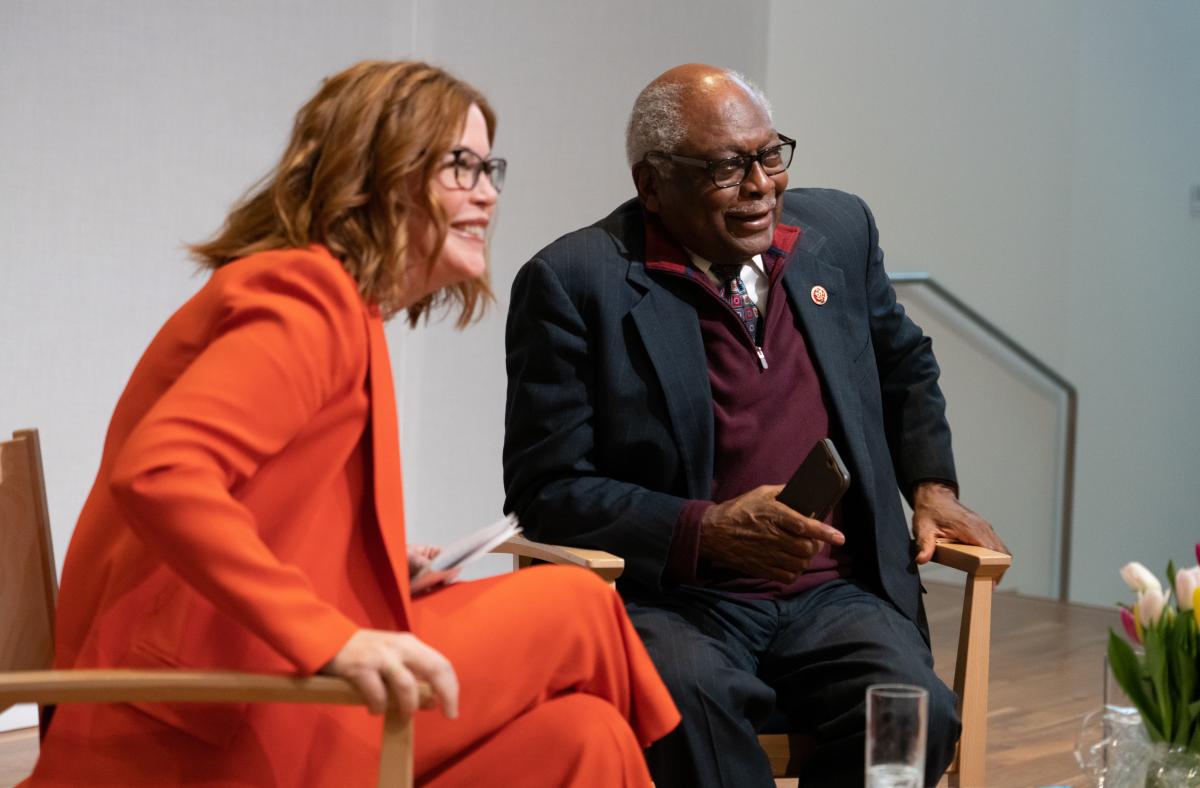E Pluribus Unum and Universal Broadband
Monday, May 2, 2022
Digital Beat
E Pluribus Unum and Universal Broadband

On April 6, House Majority Whip James E. Clyburn (D-SC) joined a packed house at the First Congregational United Church of Christ in downtown Washington, DC to help the Benton Institute for Broadband & Society celebrate its 40th anniversary. Congressman Clyburn (D-SC) is the third-ranking Democrat in the House of Representatives, and also serves, importantly, as chair of the House Rural Broadband Task Force. Not only was his presidential endorsement credited with nearly single-handedly changing the trajectory of the presidential race in 2020, but his development of the Accessible Affordable Internet for All Act changed the trajectory of the infrastructure bill itself. His legislation incorporated a bold broadband vision and laid out a critical set of challenges, principles, and goals. Things that every state, local policymaker, every community leader, and every broadband provider could embrace and evangelize. And he helped build the critical momentum necessary to ensure broadband became a foundational pillar of the historic Infrastructure Investment and Jobs Act.

Representative Clyburn was joined by Maura Corbett, CEO and Founder of the Glen Echo Group, for a conversation on a range of issues.
Corbett asked Congressman Clyburn about the divisions in our country and he immediately thought of the U.S Postal Service. He noted how it is in the U.S. Constitution of the United States to provide a service to connect communities. “That's what it's all about,” said Representative Clyburn. “Bring all the communities together—rural, and urban, and everything—so that we can fulfill our nation's motto: e pluribus unum. Out of many one.”
But he suggested that we've lost sight of that—and this is not the first time we've lost sight of that. He noted how, in Democracy in America, Alexis de Tocqueville said that America's greatness is not because it's more enlightened than any other nation, but rather because it had always been able to repair its faults.
“Now I want you to think about that,” said Clyburn. “The greatness of this country rests upon our ability to repair our faults. Covid-19 exposed a big, big fault line in this country, and to repair a lot of that fault required that we do something about internet service.
Congressman Clyburn founded the Rural Broadband Task Force to bring Members of Congress together and develop legislation to promote high-speed internet accessibility, affordability, and adoption—with the aim of closing the digital divide. The members of the task force understood the need for telehealth and telelearning.
But Congressman Clyburn does not take a top-down approach. He said, “If you can relate to people's everyday experiences, you can get them to move on a subject.” He relayed his two “aha moments” about the potential for broadband to improve health and education.
My late wife suffered with diabetes for the last 25 years of her life. Her doctor called me asking me to stop by his office. I didn't know him, but this is when we first started discussing the Affordable Care Act. And so, he wanted me to see something. And I went by his office. My wife was not there. I went alone. I thought we would just talk about the legislation, but he wanted me to see what telemedicine could do. And I watched him sit at his desk and diagnose a person with diabetes 136 miles away. This gentleman with his eyes to a monitor, and this doctor telling me, looking at his eyes, everything that was wrong. 'You see, he doesn't know it yet, but he's got diabetes. We'll inform him when this test is over.' That convinced me of the value of telemedicine. Of bringing people together.
The second experience involved education. Congressman Clyburn worked with a donor to get 100 laptops delivered to Scott's Branch High School in Summerton, South Carolina, where Brown v. Board of Education got started. When he had secured the donation, Congressman Clyburn called the superintendent of the school.
I said, "Rose,"— her name's Rose Wild— I said, "Rose, I got some great news for you." She says, "What's that?" And I told her what I had done. She said, "Well what do you want me to do with these laptops?" I said, "I want you to put them in the library, let the kids check them out, and they can bring them back just like they bring books back." She said, "What are they going to do with the laptop when they get home?" I said, "What are you talking about?" She said, "My kids are not connected to the internet. So, laptops aren't going to do us any good."
“Those two experiences are what caused me to be as relentless as I was. And when they were telling me that we couldn't do this, we couldn't do that, I sicced my staff on them and then my staff would explain to them how they could do it. And we got it done.”
“So, I tell people all the time,” Congressman Clyburn concluded, “one of the reasons we have these divisions is that we have not spent enough time appealing to people on a more personal level… with something they can identify with. [If we do that,] I think we can get to a better place.”
Additional Content from the Celebration
The Benton Institute for Broadband & Society is a non-profit organization dedicated to ensuring that all people in the U.S. have access to competitive, High-Performance Broadband regardless of where they live or who they are. We believe communication policy - rooted in the values of access, equity, and diversity - has the power to deliver new opportunities and strengthen communities.
© Benton Institute for Broadband & Society 2022. Redistribution of this email publication - both internally and externally - is encouraged if it includes this copyright statement.
For subscribe/unsubscribe info, please email headlinesATbentonDOTorg






